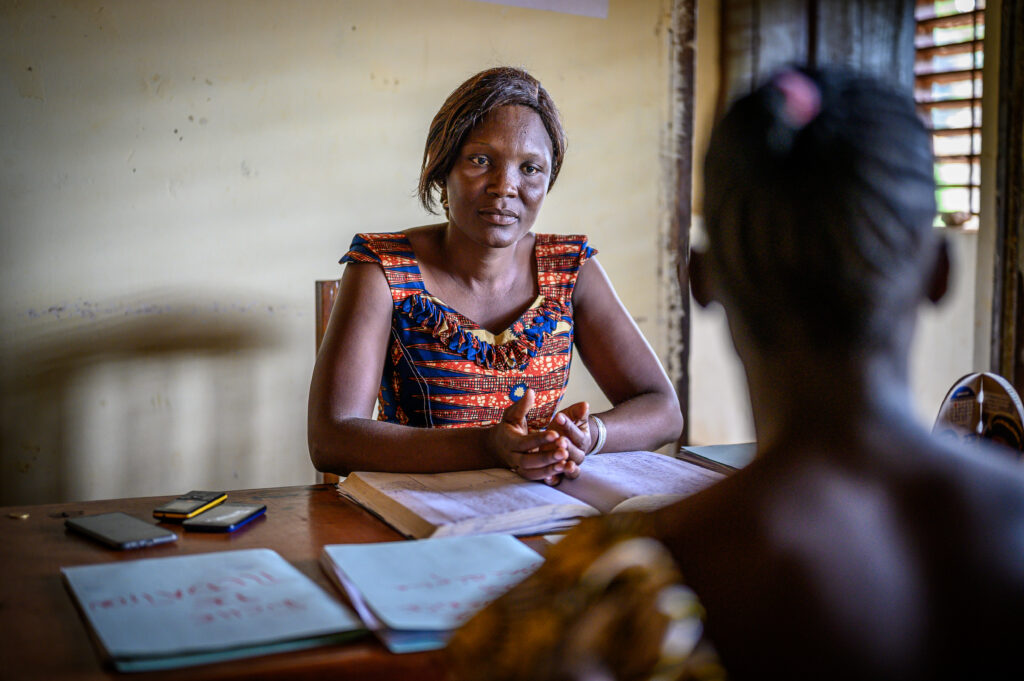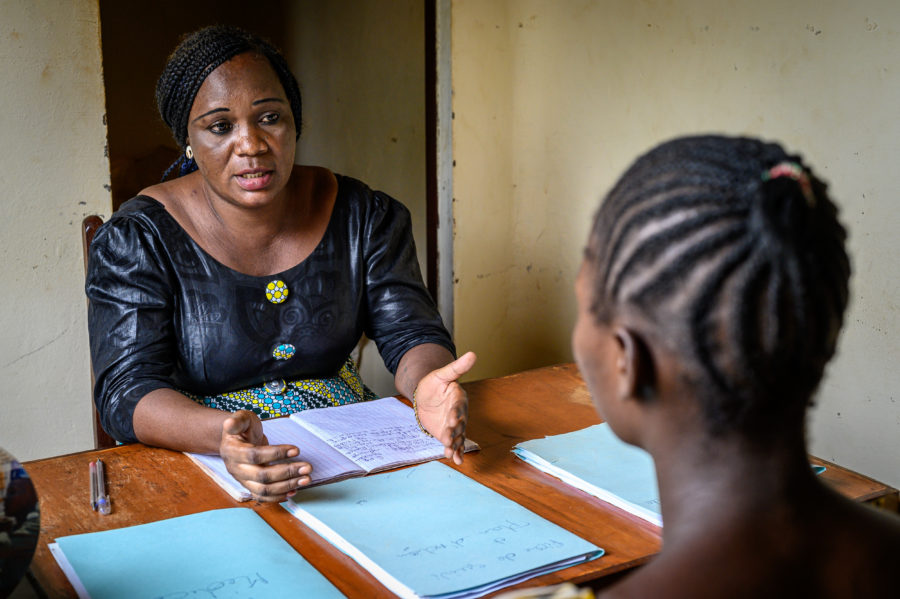Sexual violence is rampant in the Central African Republic as a weapon of war as well as in the domestic and community spheres. Most victims do not obtain medical or psychosocial care. Seeking justice is even more challenging.

Chimène Endjizekane is one of 200 female lawyers who help women and girls fight back. She runs a community centre, fully financed by Cordaid, in one of the roughest parts of Bangui. ‘Too often, the sexual abusers and rapists go unpunished. But now, we start frightening them.’
It’s not a very big centre. A waiting hall, a few consultation rooms, a place where victims can rest. The mattress of the bed in the corner is covered in red and green hearts. Outside, an old and twisted tree dominates the courtyard, right next to one of the busier crossroads of the Ouango quarter in the 7ième arrondissement.
This district, like the neighbouring 8th, is home to quite a few disarmed or allegedly disarmed anti-Balaka militia members. It’s a hot spot of violence and bottled-up anger. ‘This is the poorest part of the capital’, Ms Endjizekane says. ‘Illiteracy rates are high, particularly among girls and women. Because sexism is omnipresent – with girls being denied opportunities from birth onwards – women bear the brunt of this poverty and harmful traditions. This brutally impacts their mental and physical health.’
The war, which is still ongoing in eastern parts of the country, started in 2013 with the violent takeover of power by predominantly Muslim Seleka rebels and retaliation by mostly Christian anti-Balaka self-defence militias. Last year’s peace agreement has not stopped the fighting, the human rights abuses or the sexual violence.
What is needed most is most lacking
The horrors and witness stories are known, from young girls being raped with broken bottles to torturous gang rapes of minors, mothers and even grandmothers. Last year, Human Rights Watch interviewed 300 victims and shared parts of the chilling reality. But the stories we know are just a fraction of the reality. Most violations remain undocumented because the stigma is just too big to break the silence.
A lot of the sexual violence takes place in the farming fields or on the road to these fields, where people, especially girls and women, are trying to make ends meet and survive. Or when people are on the run, fleeing violence. They are on foot, in isolated places. Men, whether armed or not, easily abuse these situations of extreme vulnerability. They turn into sexual predators, and, most of the time, nobody stands in their way.

What victims of gender-based violence need most, and what is most lacking, is medical post-rape treatment, including safe abortion, psychological support and the means to seek justice and prosecute their abusers. It’s on these three fronts that Ms. Endjizekane and her sisterhood of lawyers and psychosocial professionals are fighting an uphill battle. With the law on their side but with barely enough means to fight a system in which corruption, sexism, and violence go hand in hand.
Setting things straight
‘The first thing that needs to be set straight’, she says, ‘is that conflict-related sexual violence is not only about violations committed by armed parties engaged in war. It goes much further than that. The armed conflict has raised levels of sexual violence in the cities, in the streets and above all, inside the homes. It’s hidden. Men and boys who have been living in close connection with weapons and killing and rape now live with their families. But they can’t cope with their traumas and frustrations. They take drugs. They beat and rape their wives, even their children.’
‘We document the facts, make sure women get the certificates they need – like medical rape evidentiary documents, we file complaints and try to start criminal cases against perpetrators.’
‘The second thing is that gender-based violence is about so much more than rape or physical abuse. The girls and women we see deal a lot with that. But what we see most is that the physical abuse is part of a pattern that includes psychological, economic and social abuse’, Ms. Endjizekane continues. ‘Parents force young girls to marry men who have more money than they have. Then the husband denies his wife – often still a girl – everything. She can’t go to school, and she can’t go to a hospital when she’s sick or pregnant. He bullies her, he hits her, and he rapes her. And most people, even the girl herself, will not see it as rape. And she will definitely not talk about it. Sometimes, she is strong enough to leave her husband but is forced to leave her kids with the abusive father. Often, she only has her parents to go back to, and chances are real that they will not accept her.’
Providing food, medical support, and legal assistance
It’s an average day in the centre d’écoute. A dozen people silently wait their turn to talk to Ms Endjizekane – the lawyer who runs the centre and provides legal aid – or the psychosocial assistant, Ms Julie Mbetid. Older persons, possibly their moms, accompany some girls. There’s an elderly man with a younger boy. With so many of the victims being girls, one would forget that men, too, are raped. ‘Not as often as women, but yes, boys have been raped by rebels. Sometimes older women with money and power rape boys’, Ms Endjizekane says. ‘For us, working with them is possibly even harder. Shame and stigma are what keep most of these boys from seeking support. They hardly ever find their way to our centre. But if they do, we support them.’
The centre was set up by the Association of Women Lawyers of the Central African Republic (the AFJC) in 2014, shortly after the war started and sent shockwaves of atrocities throughout the country.
‘We mostly receive abuse cases. My colleague, Ms Julie Mbetid, first listens to the person and will provide psychosocial support. Apart from that, we focus on three needs: the basic need for food – which can be very acute as we live in one of the most fragile countries, medical needs and the need for legal assistance. We have funds to cover the transportation, for example, to the hospital or the court, as well as the medical and legal costs of our clients.’
‘Ms Endjizekane and her community centre, like the network of women lawyers, reach out to people in the most remote villages. At the same time, they hold governments accountable, share findings and work on common agendas for justice. Slowly but surely, they bridge divides and restore trust.’
In the case of rape or abuse, the centre immediately refers the person to a hospital. ‘Post-rape care is a matter of acting fast’, she says. With some luck, the more prominent hospitals in the capital will also be able to provide psychological and maybe even psychiatric care. ‘Unfortunately, the centre has no psychologists. We do what we can, but we cannot treat traumas’, she regrets.
Stepping out of the shadow
The centre also has four para-legal community workers. ‘What we do in the centre, case management and training sessions is only half the work. Our community workers go out into the villages and make people aware of the possibilities to seek justice and legal and medical aid. They discuss topics that are silenced by stigma. They help people who have been abused to step out of the shade and seek support.’
Ms Endjizekane not only heads the community centre. As a lawyer and member of the Association de Femmes Juristes, she also supports victims in their search for justice. Of all the struggles, this might well be the most tricky one. ‘When legal aid is needed, I step in’, she says. ‘We document the facts, we make sure women get the certificates they need – like medical rape evidentiary documents, and we file complaints at the prosecutor’s office and try to start criminal cases against perpetrators.’
“It’s called corruption and it’s lethal”
It’s a tough job because fighting for the rights of individual women goes hand in hand with fighting the shortcomings of governance and justice systems. ‘All too often,’ Ms Endjizekane explains, ‘we see that abusers who committed horrible crimes are released soon after they’ve been convicted. They know the right people, pay them, and walk out. It’s called corruption, and it’s lethal. Recently, a perpetrator was released from prison, went to the mother of the girl he had raped and told her that soon he would rape her again. This is our reality. Most girls who were tortured and raped never find their way out of the circle of fear, violence, and stigma. The centre wants to support as many of them as possible, but we only have one lawyer to file cases and to follow up on them.’
Bit by bit, with the support of Cordaid and others, the Centre d’écoute and the Association of Women Lawyers are aiming for system reforms. ‘In different parts of the country, we are giving gender-based violence and gender equality courses to judges and other members of the justice system. But we can’t do it alone. Gender equality needs to be prioritised on the highest levels. The government, of whom many are willing to address and change systemic injustices, needs to tackle GBV on all fronts’, Ms Endjizekane points out.
‘We are frightening abusers and rapists because they know we will go after them. It’s a good sign.’
Flora Kwizera, Cordaid’s Security and Justice program manager based in Bangui, underscores the pivotal role played by women lawyers such as Chimène Endjizekane. ‘War and corruption have pretty much torn the social contract between Central Africans and the government’, she says. ‘Ms Endjizekane and her community centres, like the network of women lawyers and other civil society organisations like the Central African League for Human Rights, reach out to people in the most remote villages. At the same time, they hold governments accountable, share their findings and work on common agendas for justice. Slowly but surely, they bridge divides and restore trust’, Ms. Kwizera continues. ‘And they don’t let go. Once they document an instance of abuse and file a legal case, they follow up and knock on every door. This is about more than individual cases. It’s about building a country and restoring the rule of law’, she concludes.
‘Guys, don’t beat your wives!’
Change does not come overnight. But every sign of change is like a star in a dark sky. ‘I know former abusers who now help girls and women find their way to our centre. They came to our meetings, learned new things, and changed their thinking and their behaviour. Here in the 7th district, the toughest part of town, we overheard men saying, “Guys, don’t beat your wives because the women lawyers will go after you”. We are frightening abusers and rapists because they know we will go after them. It’s a good sign.’
Over 200 women lawyers in the Central African Republic form a sisterhood for justice. They fight the same battle in different corners of the country and different segments of civil society and government.
Once a month, they gather to discuss cases and campaigns. Chimène Endjizekane is one of them. She’s proud of the network, and rightly so. ‘We are a female force. From within, we exert our power to change the lives of women and girls and to change structures of injustice.’
As we leave the centre d’écoute and head back into Bangui’s whirlpool, a handful of clients patiently and silently wait their turn. We don’t know their individual stories—those are for them to share with Chimène Endjizekane and Julie Mbetid. But we do know that they have knocked on the right door.
This story is written by Frank van Lierde, Corporate Journalist at Cordaid.